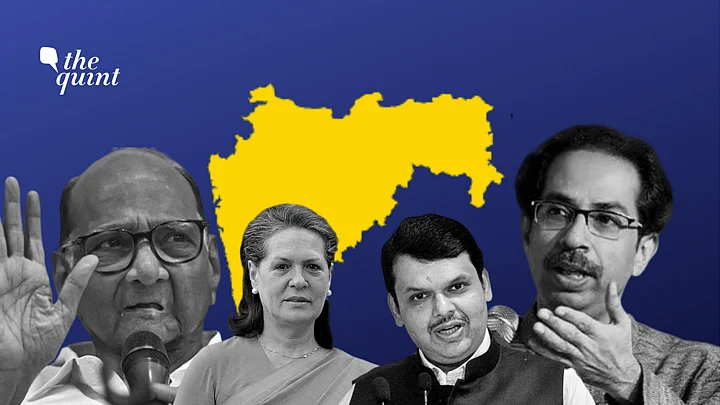Here’s a curious fact about the Common Minimum Programme released by the newly formed Maha Vikas Aghadi government of Shiv Sena, NCP and Congress in Maharashtra – the one promise aimed directly at the Marathi Manoos – a law to be enacted providing 80 percent reservation for locals in jobs – has actually come from the Congress as opposed to the Sena, which has been associated with demands such as these in the past.
On the other hand, many of the populist promises aimed at the poor, such as ‘Rs 1 clinics’ and canteens providing food for Rs 10, have actually come from the Sena.
This indicates that the two parties have much more common ground than many had expected, given their different ideological backgrounds.
The Common Minimum Programme (CMP) prepared by the three parties is a largely populist document, which focuses on pro-farmer and pro-poor policies. It steers clear of issues that might have sparked disagreement between the three parties.
Here are some key aspects:
Lip Service to Secularism
The four-page document begins with a “Preamble” which says:
“The alliance partners commit to uphold the secular values enshrined in the Constitution. On contentious issue of national importance as well as of state importance, especially having repercussions/consequences on the secular fabric of the nation, the Shiv Sena, NCP and Congress will take a joint view after holding consultations and arriving at a consensus.”
This is said to be the result of the Congress’ insistence, given the Sena’s pro-Hindutva ideology. The party leadership felt that its own secular credentials shouldn’t be harmed if its alliance partner ends up making communal statements or taking a stand which goes against secularism on national issues.
However, the CMP makes no mention of providing reservation to Muslims, which was an unfinished task of the previous Congress-NCP government in the state.
Instead, minorities have been given a vague commitment – “The government shall adopt various schemes to eliminate the social, educational and economic backwardness of the minority community and implement Constitutional safeguards for its security welfare in letter and spirit”.
Invoking the Constitution in the context of secularism and minorities appears to be a way for the Sena to tell its pro-Hindutva supporters that this is merely the implementation of Constitutional provisions and not “appeasement of minorities”.
Pro-Farmer Policies
Immediately after the “secular” preamble is the section on farmers, suggesting that this is the main policy priority for the new coalition government. Most of the promises in this section have a clear stamp of the NCP and the Congress.
The CMP promises an “immediate loan waiver” to farmers, a promise which was made by the Congress-NCP alliance during their election campaign.
In addition to a loan waiver, other promises made to farmers include:
- Immediate assistance to farmers who are suffering due to premature rain and floods
- Revising the crop insurance scheme to ensure immediate compensation to farmers who have lost their crops
- Better remunerative prices for farm produce
- Construction of a sustainable water supply system in drought-affected areas
Jobs Plan, Promises to Industry
In contrast to concrete promises vis-a-vis farmers, the Maha Vikas Aghadi’s plan to tackle unemployment leaves much to be desired. Besides promising a law providing 80 percent reservation for locals in employment, the alliance has only two action points on jobs:
- A fellowship for educated unemployed youth
- Immediate filling of vacancies in government jobs
The first promise is directly from the Congress-NCP manifesto, which had promised a Rs 5,000 allowance for educated unemployed youth. The Congress government in Punjab has a similar plan but with a lesser amount.
Almost every opinion poll said that unemployment was the biggest issue for voters, but it is unclear if these promises do enough to address the concern.
Regarding industry too, the CMP’s commitments are a bit vague. It promises “all possible concessions” and “simplified” clearances for setting up of new industries and “necessary policy reforms” for investment in the IT sector.
Sena’s Populism
Many of the populist points in the CMP bear a clear stamp of the Shiv Sena, as it includes many of the promises the party had made in its manifesto.
The CMP includes some of the key populist promises made by the Sena, such as:
- “Provide one rupee clinics at the taluka level facilitating all pathological tests.”
- “ Provide cheap and efficient food for the common people in the state for Rs 10 only.”
These schemes are important as they might end up becoming directly associated with Chief Minister Uddhav Thackeray, the way Amma Canteens in Tamil Nadu came to be associated with Jayalaltihaa, Indira Canteens in Karnataka with Siddaramaiah, Annapurna Canteens with Telangana Chief Minister K Chandrashekhar Rao and Mohalla Clinics with Delhi CM Arvind Kejriwal.
Social Coalition
Maharashtra has witnessed a spate of caste-based agitations in the last five years, and, addressing the social cleavages will be a major challenge for the new alliance.
The CMP promises to “solve the pending questions of the Scheduled Castes and Tribes, Dhangar, Other Backward Classes (OBCs), Balutadars, etc so as not to deprive the common people of basic necessities of food, clothing, shelter, education, health and employment as enshrined in the Indian Constitution”.
Dhangars, OBCs and backward communities that fall into the broad Balutedar category have, over the previous few years, drifted towards the BJP, and it is natural that the new alliance will try to woo them and expand its own social coalition.
However, there are no concrete promises regarding Dalits, despite the Fadnavis government having led a massive crackdown on Dalit activists.
(At The Quint, we question everything. Play an active role in shaping our journalism by becoming a member today.)
